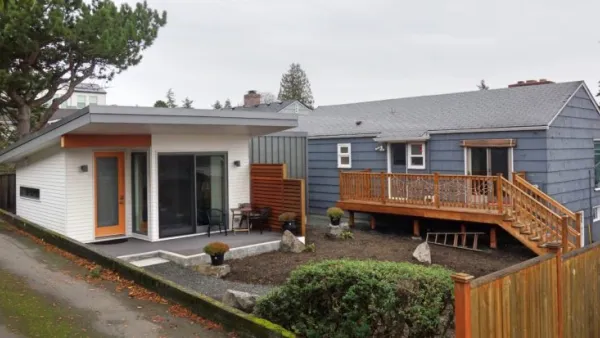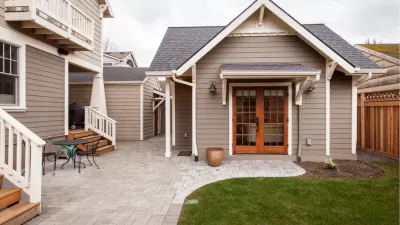A set of proposed updates to the city’s development code would expand TOD zones and encourage more backyard dwellings.

In an effort to boost housing production, San Diego officials have proposed an update to the city’s zoning rules that would expand transit-oriented development zones to a one-mile radius of a transit station and loosen regulations for accessory dwelling units (ADUs). David Garrick reports for the Del Mar Times.
Formally named the 2022 Land Development Code update, “The proposed rule changes would make an additional 5,224 acres close enough to transit to be eligible for developer density bonuses. The changes also would increase by 4,612 the acreage eligible for the accessory dwelling unit bonus program.”
As Garrick explains, “The piece of the proposal that encourages developers to build more lower-priced rental housing in prosperous neighborhoods would rely on the state’s definition of “high-opportunity” areas, which focuses primarily on the presence of educational institutions and high-paying jobs.”
The roughly 80 proposed changes also include “prohibiting new storage facilities on prime industrial land, loosening rules for pool demolitions at historic homes and specifying that converted parking lots must be used for outdoor dining, not retail.” After gaining unanimous approval from the city’s Planning Commission in December, the proposal must pass through the Land Use and Housing Committee and the full city council next month.
The city is relatively unique in that it updates its development code en masse once a year, in contrast with other municipalities that make zoning and development changes piecemeal.
See the source article for more details about proposed changes and the pushback from critics who want to preserve the current zoning code.
FULL STORY: San Diego could OK many more high-rise homes and backyard apartments under new city housing proposal

Maui's Vacation Rental Debate Turns Ugly
Verbal attacks, misinformation campaigns and fistfights plague a high-stakes debate to convert thousands of vacation rentals into long-term housing.

Planetizen Federal Action Tracker
A weekly monitor of how Trump’s orders and actions are impacting planners and planning in America.

In Urban Planning, AI Prompting Could be the New Design Thinking
Creativity has long been key to great urban design. What if we see AI as our new creative partner?

King County Supportive Housing Program Offers Hope for Unhoused Residents
The county is taking a ‘Housing First’ approach that prioritizes getting people into housing, then offering wraparound supportive services.

Researchers Use AI to Get Clearer Picture of US Housing
Analysts are using artificial intelligence to supercharge their research by allowing them to comb through data faster. Though these AI tools can be error prone, they save time and housing researchers are optimistic about the future.

Making Shared Micromobility More Inclusive
Cities and shared mobility system operators can do more to include people with disabilities in planning and operations, per a new report.
Urban Design for Planners 1: Software Tools
This six-course series explores essential urban design concepts using open source software and equips planners with the tools they need to participate fully in the urban design process.
Planning for Universal Design
Learn the tools for implementing Universal Design in planning regulations.
planning NEXT
Appalachian Highlands Housing Partners
Mpact (founded as Rail~Volution)
City of Camden Redevelopment Agency
City of Astoria
City of Portland
City of Laramie





























